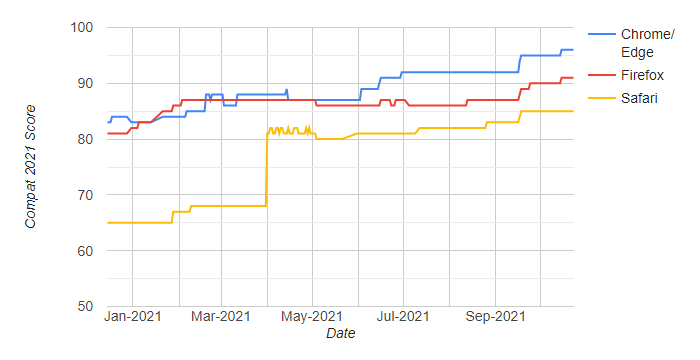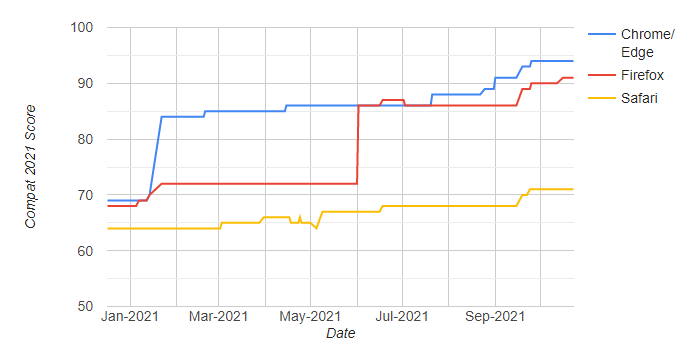
When the internet was young, and people were just about to learn about the new World Wide Web, Microsoft was already on top.
With its Internet Explorer web browser, Microsoft engaged in the first-ever web browser war, and became the monopoly after bundling the web browser with its Microsoft Windows operating system. The extent of its dominance was so great that Microsoft commanded 90% of the young internet market.
As a result, web developers and web designer had to start creating websites around what Internet Explorer could or could not do.
As all empires eventually fall, Microsoft’s ubiquitous presence started fading as it continually ignored web standards and continually missed update. Microsoft did not follow the guidelines set by the World Wide Web Consortium – the organization that establishes standards for web technologies.
And since Google introduced Chrome, Mozilla with Firefox and more, Microsoft's Internet Explorer struggled to keep up with the stupendously fast adoption and growth of the web. This made websites running on Internet Explorer to often look different than on others like Opera and Firefox.
After Microsoft ceased Internet Explorer in favor of Edge, many older generations of web developers can still remember the nightmare of having to develop websites purposefully for the browser.
As things start to go easy on web developers, another thing is dragging them down.
This time, it is suggested that Apple's Safari web browser can actually become the next Internet Explorer.
Read: Google Search Ends Its Support For Microsoft's Internet Explorer 11
According to a test by the Web Platform Tests dashboard, Blink-powered Chromium-based browsers support 94% of its test suite, while Gecko-made Mozilla's Firefox achieved a very competitive 91%.
Safari however, only managed to get 71%.
The scores on the test represent how well browser engines are doing on the 2021 Compat Focus Areas, as measured by wpt.fyitest results, as explained by the dashboard.
Features tested include: aspect-ratio, css-flexbox, css-grid, css-transformation, and position-sticky.
Each of these features contribute up to 20 points to the score, based on passing-test percentage, giving a maximum possible score of 100 for each browser.
In this test, Apple's Safari lags considerably behind its peers in supporting web features.
While Safari fairs way better than the Microsoft-made browser, it is said that the reason Apple is lagging is because its WebKit engine that powers Safari, is well behind the competition.
As a result of this, the Safari browser is late in adopting new syntaxes and functions, and is lagging behind in supporting some newer technologies and extensions.
For end-users, this may not matter much, as they can always switch to Chrome or Firefox, or some other browsers.
But on iOS and iPadOS, that cannot be done.

This is because Apple has strict rules regarding web browsers on its mobile operating systems.
According to Apple's rules, all apps that can browse the web "must use the appropriate WebKit framework and WebKit JavaScript."
What this means, every iOS and iPadOS user is literally a Safari/WebKit user, whether they use Safari or Chrome.
In other words, iPhone and iPad users are bound by Apple's own limitations, regardless the browser they use.
Apple can have this level of control and monopoly, simply because the company controls a vast ecosystem that is well-protected by its rules and none others.
This is something Microsoft was never able to achieve with its Internet Explorer.
Another distressing thing web developers find, is Apple's slow development cycle. Unlike Chromium-powered browsers that are frequently updated, Safari is updated once every few months, at best.
What this means, Apple is not only slow in adding new features, as it is also slow in its development cycle.

It has been in arguments that Apple is doing these on purpose.
Some people said that Apple doesn't prioritize the development of WebKit because it wants to protect its Apple App Store business.
If Apple speeds up the development of WebKit framework and WebKit JavaScript, Apple fears that developers will start building better web apps, and lesser people will download or buy apps on its App Store.
Apple's App Store is a huge market worth billions of dollars, and Apple may not want to risk it.
But those who are pro Apple, including Apple itself, argues that the company isn't implementing much into the development of WebKit and its APIs because doing so will allow developers access to an array of sensitive information, like access to USB ports, Bluetooth, battery status and other built-in sensors that could be used by advertisers to build fingerprint data.
But whatever is the case, the truth is that, WebKit is lagging.
And in the competition that is dominated by Google's Chromium, Apple users on mobile are seeing the web in a way that is slightly different that their peers.
If Apple wish to become friendlier to web developers, all it needs is to not repeat what Microsoft did with Internet Explorer. If Apple really wants to compete against Google in the browser business, it needs to provide a real alternative to Chrome.
Apple should be at least be more transparent in what it does, and be less opaque in its development process.
Read: Cookies, Browser Fingerprinting, And How You Can Delay The Death Of Online Privacy
